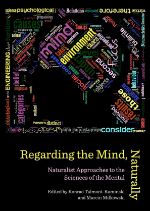|
Naturalizing Epistemology for Autonomous Systems |

|

|
|
Written by Ricardo Sanz
|
|
Monday, 18 April 2011 |
|
A recent book contains a chapter by Jaime Gomez on scientific epistemology for autonomous agents:
Naturalizing Epistemology for Autonomous Systems by Jaime Gómez in Regarding the Mind, Naturally: Naturalist Approaches to the Sciences of the Mental by Talmont-Kaminsky and Milinkovski (Eds.). ISBN 978-1443843416, Cambridge Scholars Publishing, 2013.
| An excerpt from the introduction of the book:
Naturalism is currently the most vibrantly developing approach to philosophy, with naturalised methodologies being applied across all the philosophical disciplines. A number of questions have been pursued in this context. What is the place of the mind in the world? How should we study the mind as a natural phenomenon? What is the significance of cognitive science research for philosophical debates? In this book, philosophical questions about the mind are asked in the context of recent developments in cognitive science, evolutionary theory, psychology, and the project of the naturalisation. Much of the focus is upon what we have learned by studying natural mental mechanisms as well as designing artificial ones. Mechanistic and functional models of the mind are used to throw new light on discussions regarding issues of explanation, reduction and the realisation of mental phenomena. Finally, naturalistic approaches are used to look anew at such traditional philosophical issues as the correspondence of mind to world and presuppositions of scientific research.
|  |
The book Regarding the Mind, Naturally is available in bookshops. More details from Amazon.
Gomez's chapter explores issues concerning naturalized epistemology and the use of isomorphism criteria in the analysis and construction of autonomous systems. A naturalized epistemic account is proposed following the constructivist paradigm. We begin by defining the basis level, where irreducible extralogical-phenomenic primitives are set out. Upon the simple primitives of basis level, further and more complex levels are defined, through a subsumption process, permitting to correlate different conceptual levels in terms of their respective primitives. Following this constructivist practice, we expect to obtain a shaped set of isomorphisms between the system form, that is, the epistemic part of the system, and a range of perceived objects and events of the environment where the system is placed. |
|
Last Updated ( Friday, 03 May 2013 )
|
